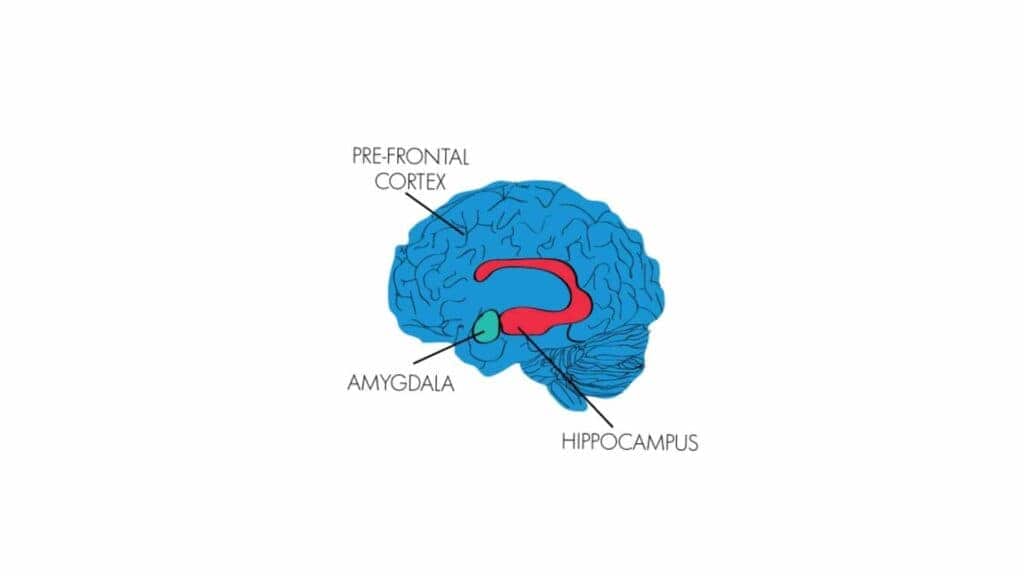We love teaching students about their brain and how to be in charge of it. When kids understand how their brain works and that they can be in charge of it, they are empowered to take responsibility for themselves. The hippocampus is one of the three key players of the brain. It is your memory box.
This lesson will show you how to teach children about the hippocampus and how to use it.
Duration: 30 minutes
Materials: Guard Dog puppet, Miss Elephante puppet, chime, brain poster, breathing ball, brain puppets, mindful coloring page, gel pens
Lesson Activities: Breathing ball and mindful coloring
Link to Video: Three Parts of the Brain
Download: English PDF / Español PDF
How To Teach It
Step 1 – Open With a Brain Break
Open with a brain break. “Before we can learn about our brain, we have to get our brain ready.”
Begin by introducing the chime if you have not already (Here’s how to do a brain break). Start off with the chime. Hands on belly or other anchor spot (heart, lap, knees). Listen to the chime consecutively from one time to three times depending on the student’s needs for getting regulated.
Use this short time to help students get their brains and bodies ready for learning.

Want More Calm & Connection in Your Classroom?
Foster more calm in yourself, your students, and your classroom with this FocusedKids brain-based emotional learning workshop.
Step 2 – Introduce Miss Elephante
A key part of this lesson is engaging the class by having the puppets do the talking. This can feel silly or uncomfortable at first but it is necessary for engaging the class and integrating the information.
The Ms. Elephante puppet is active and silly. She has trouble straightening out her trunk which is where she takes in all the memories. Walk around the circle and let students gently tug her trunk. The kids help straighten it, and Miss Elephante thanks them for their help. Now she can do her job.
Here’s the dialogue you can use:
- “My name is Miss Elephante. My brain name is hippocampus. (Repeat 5 times together)
- “My job is remembering everything that happens to you, even before you are born.”
- “I can remember the sound of your mommy’s voice when you were still in her tummy! When you are born, I am ready to do my job and continue to remember everything from that point on.”
- “I am good friends with Guard Dog and Wise Owl, and when we work together, we do an excellent job.””I am good friends with Guard Dog and Wise Owl, and when we work together, we do an excellent job.”
Step 3 – Closing With Gratitude
Create a closing routine with your class around gratitude. We know that when children practice thinking about what they are grateful for it wires their brains to be happier, calmer, and less stressed.
For this activity, maybe have children say one thing they are grateful Miss Elephante can help them remember.
Keys to Success
Vocabulary
Guard Dog, Amygdala, Chime, Calm, Focus, Emotions, Feelings, Ms. Elephante, Hippocampus, breathing ball, deep breaths
Note: We recommend having a chart that displays different feelings and emotion words and pictures.
Make it a Habit
Each time you introduce a new topic or concept (for example in literacy learning a new sound or letter) ask the class what part of our brain are we using when to remember what we learned yesterday. When you teach something new- tell students that now Ms. Elephante will store that new learning and make it a memory.
Practice it
Practice mindful coloring each day for 5-10 minutes.
Hold up the Ms. Elephante puppet at the beginning and ask students what they remember about mindful coloring. How are our bodies? How are our voices? What writing tools do we use? How do we use them? Use the breathing ball each day for one or all of your brain breaks.
Send it Home
After students have completed all 3 brain puppets send home with a description for parents about the 3 key players in the brain.
Brain Science
Your hippocampus is fully developed before you are born! When you learn something new, that new learning becomes a memory and is stored in the hippocampus.

Download Key Players in the Brain PDF
Recommended Books
Recommended Websites
Make It Your Own
Once you have the basics of being Miss Elephante down, start to explore situations in which the Miss Elephante might show up. This can help get students become more aware of times their very own Miss Elephante is trying to help them out.



